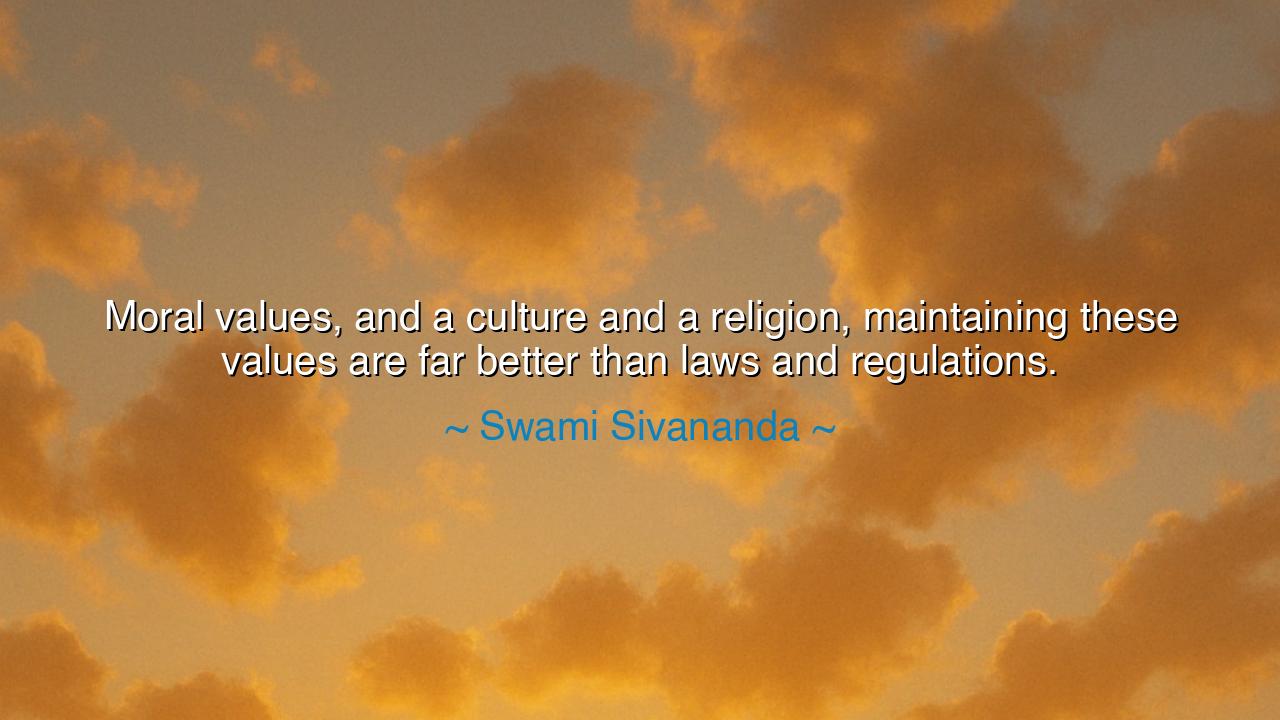
Moral values, and a culture and a religion, maintaining these
Moral values, and a culture and a religion, maintaining these values are far better than laws and regulations.






In the unfolding saga of human history, there are many who have sought to define what it means to live a virtuous life. Yet, in the wisdom of Swami Sivananda, we are reminded of a profound truth: "Moral values, and a culture and a religion, maintaining these values are far better than laws and regulations." These words speak to the very heart of what it means to live in a just and harmonious society. Sivananda teaches us that true justice and goodness do not arise from the strict enforcement of laws but from the internal compasses that guide us—our moral values, the culture that shapes our hearts, and the spiritual practices that elevate us beyond the mere fear of punishment.
The ancients understood this concept well. Socrates, in his pursuit of virtue, spoke of the importance of living in accordance with the highest principles of goodness and wisdom. He believed that no law could compel a man to be truly virtuous; rather, it was the internal conviction and the desire to live rightly that made a man good. Socrates’s life was a testament to this belief. He lived in a society where laws often sought to impose justice from the outside, but it was the strength of his moral values, his commitment to truth, and his belief in the divine spark of humanity that guided him through trials and tribulations. He did not fear the laws of the state as much as he feared the corruption of his soul. This is the essence of Sivananda's message—that true morality arises not from the external imposition of rules, but from the culture of values embedded deep within the individual.
In the history of civilizations, those societies that have thrived on the strength of moral values and spiritual integrity have often outlasted those that sought to rely on laws alone. Consider the great Roman Empire, which, at its height, was a beacon of law and order. Yet, as the empire became increasingly decadent, as its moral fabric began to unravel, no law, however well-crafted, could stem the tide of corruption and decay. The true collapse of Rome was not merely political or military, but moral. When its people no longer lived by the guiding virtues of justice, honor, and duty to one another, the empire crumbled. In this, we see that laws without the foundation of moral values are weak and, ultimately, ineffective.
In contrast, the spiritual teachings of India, upheld by figures like Swami Sivananda, emphasize the importance of the inner life as the true source of justice. The Bhagavad Gita, one of the most profound spiritual texts, speaks of the importance of duty (dharma), not as something enforced by laws, but as an internal moral guide. Arjuna, the great warrior, is reminded by Krishna that true righteousness is born from an alignment of one's actions with the divine will, and not from adherence to external regulations. In this way, Sivananda echoes the Gita's wisdom—when individuals are guided by moral values and spiritual principles, the need for external regulations diminishes, and society thrives in harmony and peace.
A modern-day example of moral values trumping laws can be found in the life of Mahatma Gandhi. Though he lived under British colonial rule, and while many laws sought to oppress and control the people of India, it was not the laws but Gandhi’s unwavering commitment to moral values and spirituality that led the Indian people to freedom. He chose non-violence (ahimsa) as his guiding principle, a moral stance that stood in stark contrast to the brutal laws imposed by the colonial government. Gandhi’s movement was not built on the foundation of rebellion against specific laws, but on a moral vision of what society should be. His success was not found in breaking laws, but in transcending them with the higher moral values of peace, unity, and truth.
The lesson Sivananda offers us is clear: while laws and regulations may govern our behavior on the surface, it is the moral values we uphold that truly guide the heart and soul of society. Moral values, rooted in spirituality, are the bedrock of a just and flourishing world. They are the internal compass that directs our actions when external forces fail us. Culture, too, plays an indispensable role in shaping these values, ensuring that they are passed from one generation to the next. Without a strong foundation of moral integrity, laws become meaningless, for they cannot reach the deeper aspects of the human heart.
In our own lives, we must ask ourselves: Do we live in accordance with moral values that guide us toward justice, compassion, and understanding, or do we rely solely on external rules to dictate our actions? Are we cultivating a culture of integrity and spiritual connection, or are we merely following the letter of the law? Sivananda calls us to look inward and to build our lives not on the surface of rules, but on the deep-rooted principles that lead to true peace and harmony. It is these values that will guide us through the complexities of life, not the strict enforcement of laws, and in doing so, we will create a world that is just, compassionate, and full of love.






AAdministratorAdministrator
Welcome, honored guests. Please leave a comment, we will respond soon